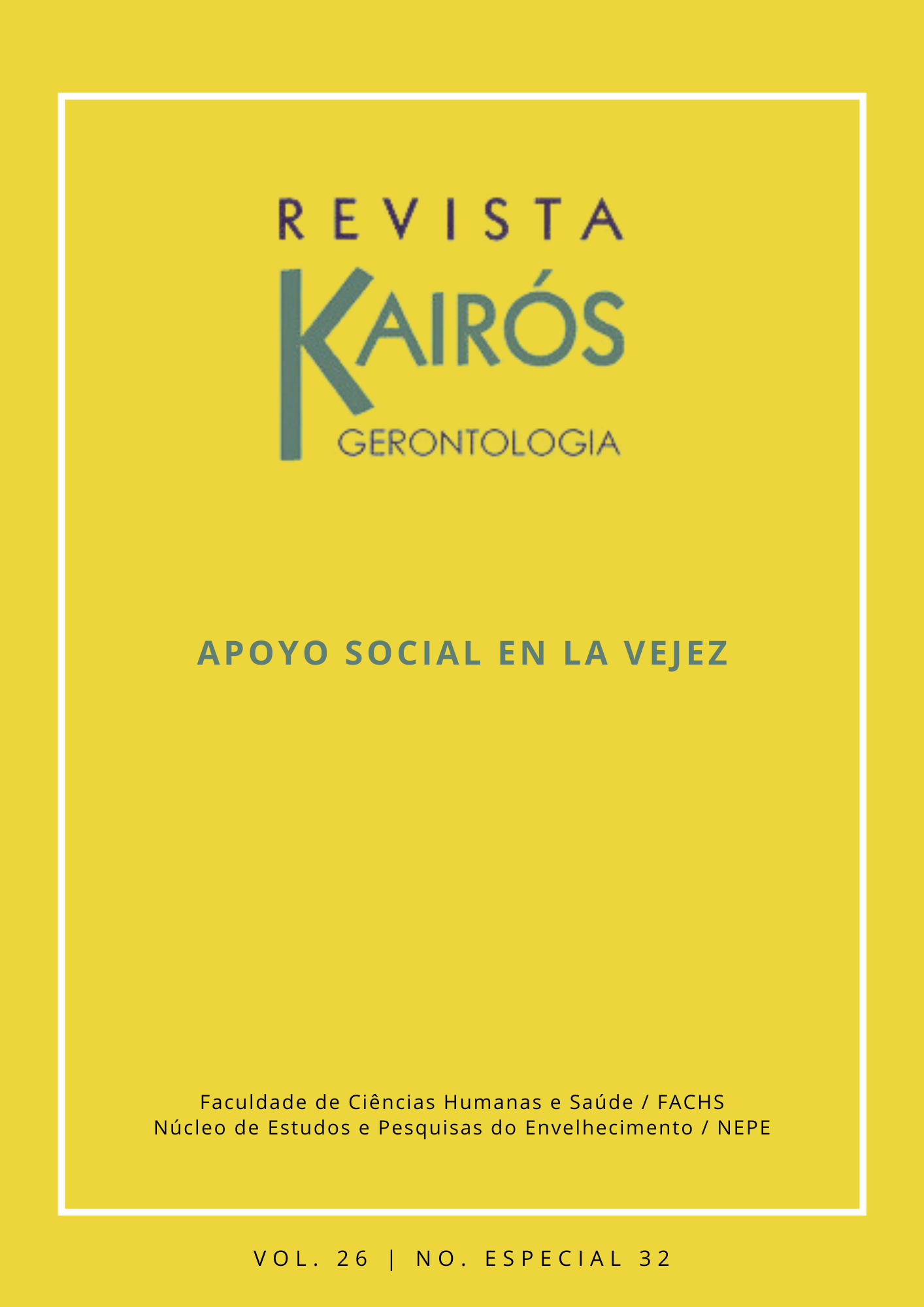Dispositivos de apoyo formal
motivos de ingreso y apoyos percibidos desde la perspectiva de las personas mayores
DOI:
https://doi.org/10.23925/2176-901X.2023.v26n32e62239Palavras-chave:
envelhecimento, apoio social, dispositivosResumo
Cada pessoa envelhece de maneira diferente, por isso a sociedade tem que oferecer dispositivos que respondam às múltiplas demandas desse grupo. Este artigo apresenta os resultados de um estudo cujos objetivos foram: em primeiro lugar, explorar e comparar as razões que levam os idosos a ingressarem em residências de longa permanência, day clubs ou oficinas educativas; em segundo lugar, investigar os pontos fracos e fortes desses dispositivos na perspectiva dos idosos. Para o efeito, foi realizado um estudo exploratório, descritivo, no qual participaram pessoas de ambos os sexos com idades compreendidas entre os 75 e os 90 anos que residiam ou frequentavam os referidos dispositivos. A partir de uma abordagem qualitativa, foram realizadas três entrevistas em grupo, uma em cada dispositivo. As histórias que emergem de cada entrevista permitem compreender a importância da existência destes dispositivos na vida das pessoas idosas e o apoio que prestam a elas e às suas famílias.
Referências
Aguinaga y Tellez (2019). El envejecimiento desde la psicología: problemas y abordajes locales. En Iuliano, R. (Comp.). Vejez y envejecimiento. Aportes para la investigación y la intervención con adultos mayores desde las ciencias sociales, la psicología y la educación. La Plata: Universidad Nacional de La Plata. Facultad de Humanidades y Ciencias de la Educación. (Andamios; 6. Serie Perspectivas).
Arias, C. y Soliverez, C. (2005). La familia del adulto mayor: antes y después del ingreso a una residencia. En Golpe, L. y Arias, C. Anuario de Gerontología institucional. Cultura Institucional y Estrategias Gerontológicas. Vol 1. 149 -154. Ediciones Suárez.
Baltes, P.B. (1990). Psychological perspectives on successful aging: The model of selective optimization with compensation. En P.B. Baltes y M.M. Baltes (Eds.) Successful aging. Perspectives from the behavioral sciences (1-34). Cambridge: Cambridge University Press.
Croas y Fernández Colmeneros (2013). Modelos Comunitarios e Institucionales de Gestión Gerontológica. Mar del Plata: Universidad Nacional de Mar del Plata.
Del Biaggio, Pavón, Banfi y Cambareri (2019). Abordaje Interdisciplinar en Dispositivo Club de Día. VIII Congreso de la Red Interdisciplinaria de Psicogerontología. Buenos Aires. UBA.
Dottori, K. Arias, C. y Soliverez, C. (2018). Educación con adultos mayores. Motivaciones y beneficios percibidos. Olhar de professor, 18 (1): 20-29.
Esquivias Luesia, M. (2015). Calidad de vida y apoyo social percibido durante la vejez. Tesis de grado, Universidad Pontificia Comillas de Madrid. Recuperado de https://repositorio.comillas.edu/xmlui/bitstream/handle/11531/1045/TFM000118.pdf?sequence=1
Fuste Bruzain, M; Perez Inerarity, M y Paz Enrique, L. (2017). Caracterización de las redes de apoyo social del adulto mayor en la Casa de Abuelos del municipio de Camajuaní, Cuba. Novedades en población. 27, 1-9.
Iacub, R. (2015). La identidad social en el envejecimiento y vejez. En Iacub, R. y Sabatini, B. Psicología de la Mediana Edad y Vejez. Mar del Plata: Universidad Nacional de Mar del Plata.
Montoro, J.; Pinazo, S.; Tortosa, M. (2007). Motivaciones y expectativas de los estudiantes mayores de 55 años en los programas universitarios. Revista sociedad Española de Geriatría y Gerontología, (42) 158-166.
Sluzki, C. (1996). La red social. Frontera de la práctica sistémica. Barcelona: Gedisa.
Terzaghi y Salvador, C. (2015). Cuidados Progresivos a lo largo de la Vida II: Cuidados en Domicilio, Servicios y Tecnologías de Apoyo. Accesibilidad. Una Vida Independiente. Curso: Políticas Públicas sobre Envejecimiento en los Países del Cono Sur. FLACSO.
Villar, F.; Pinazo, S.; Triadó, C.; Celdrán, M.; Solé, C. (2010). Older people's university students in Spain: a comparison of motives and benefits between two models. Ageing and Society, vol.30, nº8, 1357-1372.
Downloads
Publicado
Como Citar
Edição
Seção
Licença
Copyright (c) 2023 Revista Kairós-Gerontologia

Este trabalho está licenciado sob uma licença Creative Commons Attribution 4.0 International License. Kairós Gerontologia é detentora dos direitos autorais de todos os artigos publicados por ela. A reprodução total dos artigos desta revista em outras publicações, ou para qualquer outro fim, por quaisquer meios, requer autorização por escrito do editor deste periódico. Reproduções parciais de artigos (resumo, abstract, mais de 500 palavras de texto, tabelas, figuras e outras ilustrações) deverão ter permissão por escrito do editor e dos autores.


